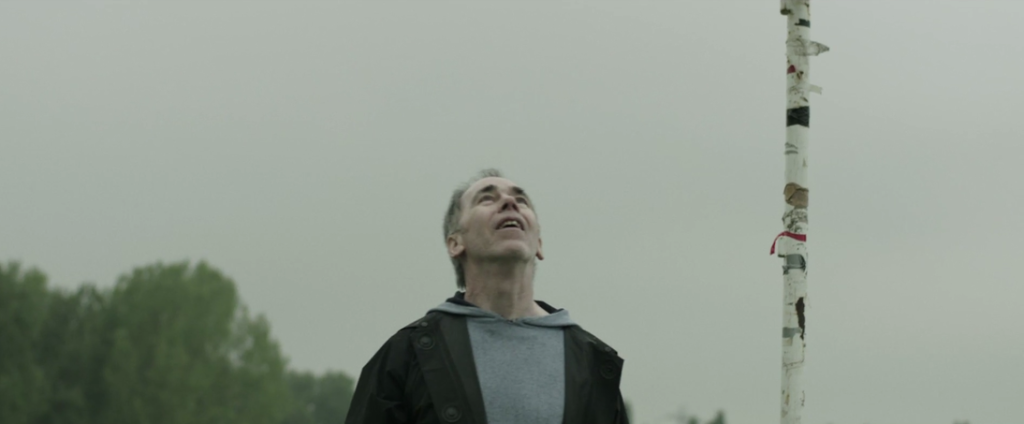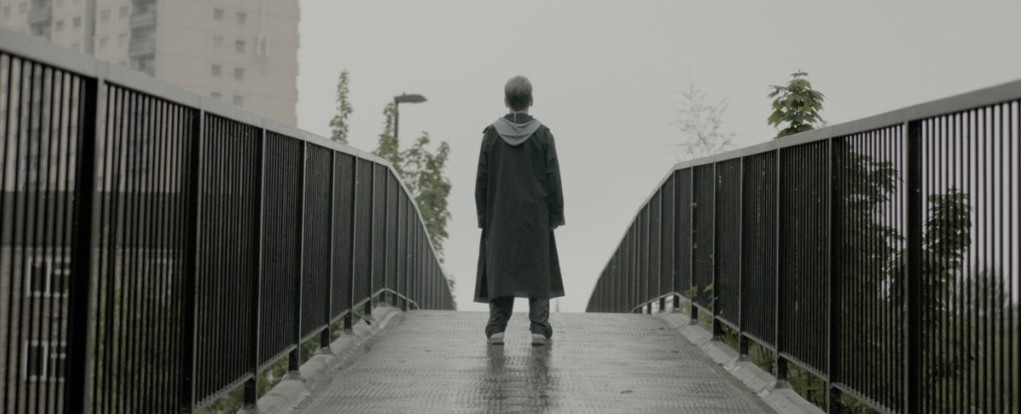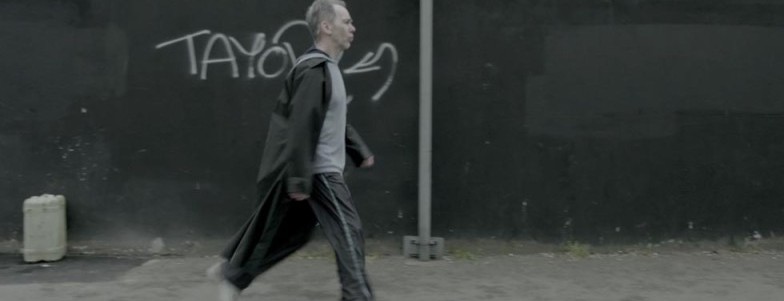The prolific young director discusses making his solo directorial debut with the affecting “Lord & Lidl”
Oscar Hudson is a London-based writer-director, best known for his work on music videos but now also making waves with his ominous new short, Lord & Lidl. The bracing three-minute film, told entirely through monologue, follows a man (Billy Clarke) who rushes to his local Lidl after God shows up at his door asking him for food. Relentless and intense, Lord & Lidl has found success on the festival circuit, appearing at the 2015 BFI London Film Festival, the 2016 London Short Film Festival, and many more.
Oscar unlocked his interest in film as a teenager, when he would film himself and his friends skateboarding. Consumed by the “culture of recording” the sport brought with it, Oscar refined his editing skills by watching endless skate videos and experimenting with his own. He later worked his way into professional filmmaking by making short films for online magazines such as i-D and Dazed, and jumped over to music videos after collaborating with his friends’ band, Velcro Hooks.
Since then, Oscar has directed music videos for such acts as Darwin Deez, Gilligan Moss and Songhoy Blues. A notable portion of his career has been in collaboration with director and DoP Spike Morris, who worked with Oscar on a series of Random Acts for Channel 4, including fox-hunting chase thriller The Hunt and globetrotting dance showcase This Way Up.
With Lord & Lidl, Oscar makes his solo directorial debut, with frequent collaborator Ruben Woodin Dechamps serving as DoP and Spike Morris on assistant camera. The film came into being as a bit of a spur-of-the-moment after Ruben, who was shooting b-roll around London as the second unit on a feature, offered the footage to help Oscar come up with a quick short on a Sunday off.
Though Oscar did not intend for or expect the film to make it big, submitting it to festivals has paid off, and it’s now made its way around England and to quite a few festivals in Germany, as well. In our chat, Oscar and I spoke about how, among other things, Lord & Lidl was inspired by the multiculturalism of his new hometown, Tottenham.
You’ve said the film is inspired by Tottenham. Did that factor into the style of the film?
Well, it’s more thematically than stylistically. I wrote it in pretty much one sitting. The whole film is a monologue, and I chose that format partly out of sheer practicality. I had one day to shoot something, I wanted to be realistic about it, and I wanted to do something that was very open-ended in terms of how the shoot could go on the day.
I didn’t storyboard it. It came up like that in reaction to another shoot I did a few weeks before, where I planned everything quite rigidly, and when I came to the edit I wasn’t entirely pleased and found that I was kind of stuck with how I’d storyboarded it, and as a reaction to that I wanted to do something a lot more open, and a bit more experimental and just a bit more fun.
So we hired Billy Clarke, who’s absolutely brilliant, and we basically had myself, Reuben, and Spike. And those are guys I make films with all the time, so we’re totally comfortable and we’re happy working for each other and running round and doing weird things, so we just had us three and Billy the actor, and set off on foot. Like, the opening shot is right outside my front door, it’s literally on my doorstep - the whole film.

Tottenham is super multicultural, and as a result of that you can just feel like many different religions on the street. Just at the bottom of Stamford Hill, you’ve got the Hasidic community. My landlord is a Hasidic Jew. Across the street from my house there’s three African Baptist churches. I’d come home at 8am in the morning and hear the people speaking in tongues, and serious, exciting Christianity going on in their houses, and that’s cool. There’s a mosque not far from me, there’s a Jehovah’s Witness church not far from me, so there’s preachers doing services at the station in the summer. You can feel it. You can feel religion in the streets, a lot, and I’m not a religious person myself, but I find that exciting, and so it was on my mind.
I had an interesting experience outside of Lidl, where a guy - and I don’t know if he was homeless but you’d probably be forgiven for maybe making that assumption - looked at me, he was a bit shabby, he took my hand - in fact, it’s in the monologue - and he told me that he was Jesus Christ reincarnate, and that all he’d have to do to make me believe him was to punch me in the face so that I’d feel some pain, and [know] I wouldn’t be dreaming.
That got me thinking about the sort of relationship between religion and insanity. It’s an interesting distinction, because the ways you might describe religion frequently fit with some definitions of schizophrenia. If you just changed the language that Christians use regularly ever so slightly, you may find yourself sectioned. If you told someone that there’s somebody speaking to you that you can talk to telling you what to do and guiding your actions, who watches over you all the time, that sounds an awful lot like Christianity.
I didn’t make the film as a sort of critique of Christianity or anything; it’s just an interesting observation. Neither is the character meant to be explicitly mentally ill, although a lot of people assume that he is, and a lot of that just feeds back into the same conversation.
You can feel religion in the streets … I find that exciting.”
The unconventional style, with the voiceover and the quick pacing and the ominous music, is very noticeable in the film. Does this kind of style come naturally for you?
Yeah, kind of. I find myself doing slightly darker, ominous styles naturally. I’m not quite sure where it comes from. I used to draw people all the time when I was growing up, and all my sketches of people, they looked like the person but they looked like a horrible, ugly, dark, twisted version of [them]. Maybe that’s something that happens in the films I’m making, as well.
I like edits that are harsh. I like to use the edit to feed into the story a lot, and I quite like abrasive stuff. And that music, I am not a musician but I made that music myself. It’s [done on] this very strange, old Indian violin thing that someone brought me back from India, just pitched up and down. And I just screeched away on these weird little strings it’s got.
How have different audiences reacted to the film? Do people understand it after the first watch?
Well, festival audiences only get one shot at it, so I don’t know. I know not everybody loves it, but generally, yeah, people like it. People say nice things about it, but people also say - people who have watched it more than once - say that it benefits from watching a few times, it is very dense.
There are a lot of ideas in there that you can’t necessarily keep up with just cause it’s so unnaturally paced. I actually sped the monologue up. It’s played at something like 115%, and then I pitched his voice down so it doesn’t sound like a chipmunk. I wanted it to have that intensity, that sort of flowing pace.
I think that it’s good that people get more from it on repeat viewings. It wasn’t my intention to make some kind of complicated text that you can study in that kind of way, by any means. I just wanted to make something that felt fast and immersive.
This was your first film as a director. How does working on your own compare to the collaborations you’ve done in the past?
On the nature of collaborating and working alone, I do prefer working by myself as a director. There’s pros and cons to both sides of it. It can be great just to sit down and bounce ideas, it can speed up the creative process, but I do like also just to get my head down, and doing drawing and writing things down on a piece of paper, and just disappearing into something. That tends to be how I work most of the time.
This project is a good example of a piece [in which] I was lucky to have a chance to use the equipment. Sometimes there are technical [and] expense barriers between making a film and writing a film, and in this instance I’m very lucky that the people that I make films with are also my very good friends, and I’ve known them for a long time. We’re still excited to make films with each other, and enjoy the process very much, and we can call on each other when we need a favor, and make it happen.
I’m working on another short at the moment, and I wanna get a bit of money in place to go make that. Lord & Lidl cost a day rate for the actor and the price of six oysters. I wanna get a bit of money in place for the next thing, but I wanna figure out a way of doing that whilst maintaining creative independence. And I think Lord & Lidl’s a good example of [that]. I mean, I did everything on it: the editing, the sound, the music.
How long did it take to complete the whole thing?
Well, it was prepped for over the course of five days, including writing and everything, shot on a Sunday, and then it sat on my harddrive whilst I was busy with other things. I sat down with it, worked on it occasionally between other projects, and eventually got a cut together probably 6 months later or something. Not that it took 6 months to edit it, it was just one of those things.
Do you think that anything specific has carried over from your music video work into the creation of this short?
Oh yeah, definitely. The music videos are great practice, just simply in the sense of knowing what it takes to make a film happen. They’re really important to me in that respect. They’re a great platform for making ideas happen that just don’t make sense in any other context. I’m really interested in a lot of these kind of in-camera, techie kind of special effects and conceptual ideas. I’m not really interested in those in short film, I kind of want to be doing slightly different things, but music videos are a great outlet for that. And you get a little bit of money to make something happen over a short period of time, and people will watch them.
As well as Lord & Lidl’s done, it probably hasn’t been watched by a fraction of the people who’ve watched some of the music videos I’ve done. I like working across genres. Documentaries as well, I’ve got a doc I’ve been working on for a while.
[Music videos] are a great platform for making ideas happen that just don’t make sense in any other context.”
Can you tell me anything about that?
It’s called A Second World. It’s about abandoned socialist monuments in Yugoslavia, and an old man who can speak to a Utopian socialist alien galaxy.
We shot that quite a long time ago now. We shot it and edited it, and despite knowing better, we ended up with a 30-minute cut, which is probably too long for the festivals, so it hasn’t really done anything, and it didn’t get that kind of breakthrough acceptance. We’re now in the process of doing a shorter edit, just trying to make it a little bit more programmable.
I co-directed it with Reuben, who’s usually my DP. We drove around in a van for a month through Serbia and Croatia and edited it together, and it’s just been the two of us just stuck in it. And now with a bit of distance since we’ve seen that cut, I think we can see how it can change.
What else are you currently working on?
I’m always making music videos. And I have script I’m finishing off at the moment, which is about scary statistics, people feeling afraid of numbers, and the gap between reality and the figures that attempt to represent reality.
Check out oscarhudson.com to learn more about Oscar’s work. Follow Oscar on Twitter @oscar_hudson.




